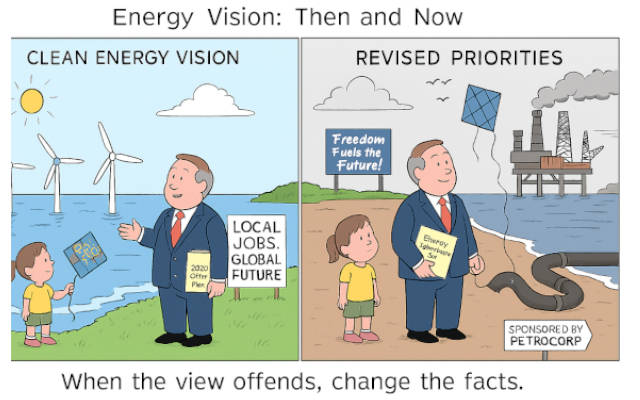What The Right's War on Wind Is Really About
By EVWorld.com Si Editorial Team

What the "war" on wind is really all about.
By EVWorld.com Si Editorial Team
Donald Trump's hostility toward wind turbines has become a political spectacle—mocking their appearance, exaggerating their dangers, and falsely claiming they cause cancer or kill whales. But beneath the bluster lies something more revealing: a worldview that sees clean energy not just as inefficient or unattractive, but as ideologically threatening.
Trump’s vendetta began with a personal grievance. In the early 2000s, he tried to block an offshore wind farm near his golf course in Scotland, arguing it would ruin the view and hurt tourism. He lost the legal battle, but the fight became symbolic. Wind turbines weren’t just eyesores—they were intrusions. They represented a future he didn’t want to see.
That sentiment echoes across much of the conservative movement. Climate science, by its nature, demands collective action. It implies regulation, international cooperation, and a rethinking of market priorities. For conservatives steeped in free-market orthodoxy and skepticism of government intervention, this is an existential challenge. Accepting climate science means accepting limits—on extraction, on emissions, on unchecked growth.
So the resistance isn’t just economic, though fossil fuel donors and deregulation deals certainly play a role. It’s cultural. Climate action is often framed as elite, urban, globalist—values that feel alien to rural, nationalist, or religious conservative identities. Wind turbines become symbols of that divide: tall, quiet, and foreign, dotting landscapes that once signaled industrial pride.
There’s also a paradox at play. Studies show that among Republicans, higher scientific literacy often correlates with greater skepticism of climate science. Why? Because knowledge becomes a tool for defending identity. Facts aren’t neutral—they’re filtered through tribal lenses. Climate denial isn’t ignorance; it’s allegiance.
Trump’s war on wind, then, is more than aesthetic. It’s a rejection of what wind power represents: interdependence, innovation, and a future shaped by science rather than nostalgia. It’s a defense of fossil fuel mythology—where oil rigs mean strength, and regulation means weakness.
But the mythology is cracking. Courts are beginning to accept climate attribution as legal evidence. Youth-led lawsuits argue that government support for fossil fuels violates constitutional rights. Cities are suing oil companies for damages tied to deception and delay. The resistance is still fierce, but the terrain is shifting.
Climate science doesn’t care about ideology. But ideology cares deeply about climate science—because it threatens the stories we tell about freedom, prosperity, and control. Trump’s war on wind is a war on change. And change, inconvenient as it may be, is already in motion.
Original Backlink
Views: 676
Articles featured here are generated by supervised Synthetic Intelligence (AKA "Artificial Intelligence").
